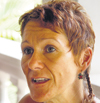|
|
||||
|
Get fit and detox through fasting Fasting can be good for you, says Naturopath Annett Annighofer-Mahrdt
How does a week of fasting sound to you? When missing a single meal is insufferable, doing so for a week is out of the question, wouldn’t you agree? “It is not torture,” insists German naturopath Annett Annighofer-Mahrdt, adding that “You will have to try it to see how it can enhance your awareness, feeling of wellness and relaxation.” Everyone apparently feels the same – that they cannot miss a meal. But two or three days into the fast, your stomach will tell you that it is not hungry any more. “Your appetite will simply not be there, although you may long for food,” Annett says.
During the three seminars that she conducted in Bentota, Galle and Hikkaduwa during the last year, Annett was very surprised that most of participants, who thought that they would not survive the week, did well and had no problems whatsoever. “They were excited that they did not feel an appetite, but rather energised,” she smiled.
However, it’s not entirely a period of not-eating-at-all! Participants are served tea, water, diluted vegetable bouillon (broth) and fruit juice without sugar. Diluted enough, the liquids do not make the digestive system work. However, Annett ensures that people who fast take sufficient vitamins and mineral salts that would enable them to run, walk and play games. Annett explains what occurs within a body during a fast, when the body switches from the eating to the not-eating mode: The stomach juices used for digesting food are not produced, causing the stomach to shrink and the system to stop operating. This will give the large intestines an opportunity to flush out all the toxins clogging its walls. All energy that is normally used for digesting will then go to the brain to enable the mind to work more clearly. It also helps the liver and kidney to flush out waste. Through breathing, lungs get de-toxed, and all other organs become clean. In the meantime the body uses the energy from fat deposits for other activities. Annett recommends fasting vacations for ages 30-70, if a person is fit, and does not have health problems or diseases such as diabetes, TB, cancer and bulimia. The therapy is contraindicated during pregnancy. Are there any side effects? During the first three days of the fast, a few might experience mild headaches or joint pains, as a result of the toxins coming out. To counter this effect, participants are encouraged to drink plenty of water and are given homeopathic remedies. A side effect of the practice is weight loss of approximately 3-4 kilos at the end of the week. With altered diet patterns, a person can ensure that he does not put the weight back on. It appears that men lose weight faster than women, owing to their metabolism and the rate of using energy. What happens after the week of fasting? “After one week of not eating, one needs to eat carefully,” Annett cautions. Fasters are advised on what and how to resume eating gradually, for it would take time for the body to adjust to eating again. With the toxins in the body flushed out, everything is clean and the system starts fresh once again. Should participants wish to do so, they are advised to continue fasting at home for another week. Undoubtedly causing the most discomfort during the fasting period is the process of flushing out. On day one, participants are given half-a-litre of salty water that tastes like seawater that inevitably results in diarrhoea. Thereafter on every second day, they are given an enema that cleans out the entire system. Research indicates it has proved beneficial for sufferers of chronic diseases, such as rheumatism, arthritis, gout and high blood pressure. Research shows that people of various religions – Christians, Muslims and Buddhists – have practised fasting from ancient times. “It is a proven science,” Annett insists. In Germany, she says, there are many clinics that offer the programme for patients with ill health. Annette advises fasting once a year. “Fasting can be a relaxing holiday,” she stresses. However, it should be conducted away from work, home and the family, where one can feel relaxed and stress free. A trained nurse, who served at a large general hospital in Germany and a Rehabilitation Centre for Cardio Vascular Diseases, Annett underwent formal training in naturopathy for two-and-a-half years, and in homeopathy. She lived in Sri Lanka with her family in the mid-’90s, and has been back here since 2003.
|
||||
Copyright © 2006 Wijeya Newspapers
Ltd. All rights reserved. |
